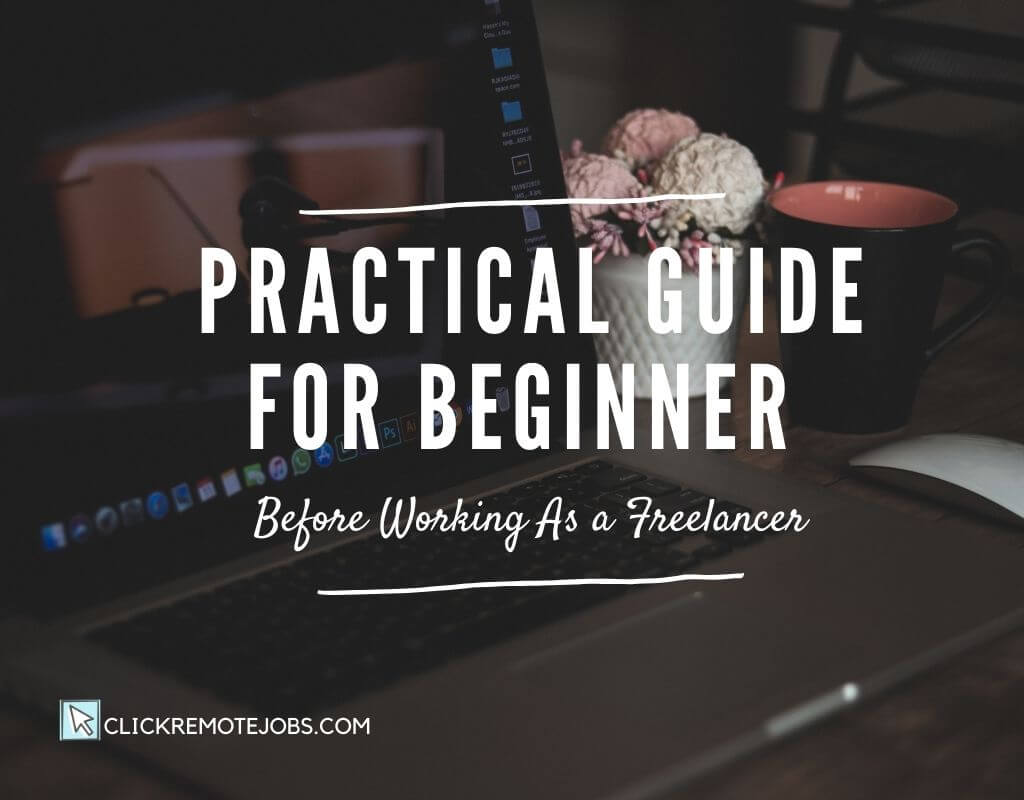Are you planning to kickstart your freelance career but lack experience? No worries! We have curated a practical guide specifically designed for beginners like you, to help you embark on your freelance career with confidence and success.
Starting out as a freelancer may seem daunting, but we’ve got you covered. We’ll provide you with all the necessary information and answers to get you on the right track.
First, let’s define what it means to be a “freelancer.” A freelancer is an individual who offers services in exchange for a fee. It’s a form of self-employment where you provide services to clients, who then compensate you for your project-based or contract work.
Since freelancing is essentially a home-based business, a solid start, and setup are crucial for delivering exceptional service experiences. And that ultimately translates into good business and a rewarding return for you! Our practical guide will assist you in planning, preparing, and building a solid foundation before diving into the world of freelancing.
Treat freelancing like a business
Therefore, a strong start and setup are vital for providing exceptional service experiences, leading to a successful and profitable venture.
To begin, your first practical guide as a freelancer is to identify your niche or niches. That’s right—plural! You have a multitude of talents to offer, and it’s time to tap into them. Your niche refers to the specific services you offer to your clients.
Here’s how you can identify your niches:
Find your niches in your profession
Review your recent CV and identify the professional skills you frequently utilized in your previous projects. Pinpoint the job functions in which you excelled and received positive feedback from your boss or team. Make a list of the top three skills.
Find your niches from your passion
Consider activities that bring you joy and confidence during your free time or days off. Seek input from your family and friends regarding your passions. Jot down the top three themes.
Explore new interests
Think outside the box and consider any job roles you’ve been curious about. There are countless ways to learn more about a particular job. Including it in your list can bring excitement and motivation. Who knows, this “new interest” might become your highest-selling service over time.
Narrow down the list
Now, narrow down your list to three niches that you truly enjoy and envision yourself thriving in. Remember to have faith in your abilities, as a little self-belief goes a long way.
A little faith in your abilities will take you a long way.
Curious to know if your niches are in high demand? Check out our comprehensive guide on booming REMOTE JOBS.
Did you know that blogging can also generate passive income? If you’re interested in learning how to start your own blog, feel free to sign up now! (Click here)
Identify your brand
Moving on to the second practical guide for freelancers—identifying your brand. Your brand represents your unique identity as a freelancer. Your brand tells your story and communicates your unique selling proposition and values. These are the qualities your clients expect from you.
Establishing a strong brand sets you apart from the competition and can significantly contribute to winning projects. So where do you start? Consider building your own website.
Here are the essential points to consider when creating your brand:
Brand name
Let’s say your name is Anna Margarette Simon Dela Cruz, and you offer writing services. You can create a brand name that reflects your profession, such as “Anna the Writer.” Alternatively, you can use your own name, opting for a shorter or abbreviated version like “Anna Dela Cruz.” Notice the difference?
Your brand’s voice
As a freelancer, maintaining a consistent tone of voice is crucial. Your tone reflects your values and your way of thinking. It’s not just about what you say but also how you make your audience feel.
Maya Angelou once said, “People don’t always remember what you say or even what you do, but they always remember how you made them feel.”
Launch your freelance career through social media channels
To make a genuine impact on your audience, focus on building a select few networks for your freelance brand. It’s essential to choose the right platforms based on your expertise. For example, if you’re a freelance photographer, Instagram or Pinterest might be ideal. Identify where your target audience is and where you can attract new freelance businesses simultaneously.
Learn how to build your own website. Establish your brand. And earning passive income.

If you’re yearning to unlock the secrets of amplifying your personal brand to new heights, we have just the answer you’ve been searching for. Prepare to dive into an illuminating article that holds the key to your success. Click right here and let the transformation begin!
Start your freelance career with this crucial guide
Planning and organizing your work effectively is a crucial practical guide for any freelancer, especially beginners. As a freelancer, you’ll be playing multiple roles and shouldering various responsibilities, including building your brand, finding new clients, creating contracts, sending invoices, managing expenses, handling social media, administrative work, and more.
You’ll find numerous tools to help you manage different aspects of your freelance business effectively. Here are some essential types of tools:
Project Management Tools
These tools assist in planning, executing, and controlling all aspects of project management. They ensure your projects flow smoothly and tasks are completed on time.
Financial Tools
Since freelancers don’t have regular paycheck, income is derived from various sources, often at irregular intervals and varying amounts. Financial tools streamline your freelance finances, from proposals to payments. They help you track cash flow, invoice clients, record payments, and assess profitability.
Time Management Tools
Freelance work is driven by deadlines and deliverables. In this industry, time is equivalent to potential business. Efficient time management reflects your competence. Time tracking tools optimize your work time and allow you to evaluate your productivity.
As the saying goes, “When you’re a freelancer, time is money.” Do you agree?
Customer Relationship Management Systems
CRM is your ally when it comes to managing your freelance business. It helps you organize email conversations, handle incoming leads, and schedule upcoming workloads. These tools can sync with your contacts and calendar, providing a seamless work system.
Online Communication Tools
Working remotely with clients requires efficient and reliable online communication tools. You need a dedicated channel to share ideas, discuss deadlines, update progress, milestones, and more. Choose communication tools that align with your specific needs.
Cloud Collaboration and File Management Tools
These tools make sharing project materials effortless. You need secure storage for your digital files that can be easily accessed by you, your clients, or your team from any device.

Conclusion
In conclusion, it’s evident that our world is shifting towards the “gig economy.” As a newcomer to the freelancing industry, understanding how to run a one-person business might initially seem overwhelming. However, our practical guide provides you with ideas and suggestions to help you take the right steps before becoming a freelancer.
Freelance work is not always easy, and there will be uncertain times that cannot be avoided. Anticipate inconsistent income and occasional challenges in your freelance journey. However, by offering services you love, you can stay motivated and keep up with the pace. Remember Steve Jobs’ famous quote:
The only way to do great work is to love what you do.
We’d love to hear about your identified niches! Feel free to drop a comment below, sharing your information and services.
Are you ready to start your freelance career?
